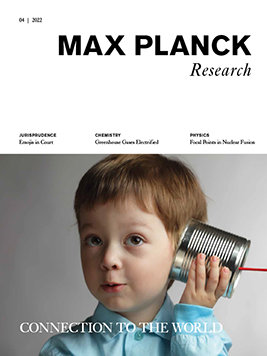Viewpoint
Everything is getting more expensive. Prices for energy, food, and many other things are rising sharply. The European Central Bank has been trying to counteract this trend since June 2022: it has already increased interest rates four times and has announced further base rate hikes. But is this the right strategy? Political scientist Martin Höpner warns against overzealous monetary policy and recommends keeping an eye on wage trends.
Visit to
When he was still in primary school, Krishna Gummadi learned to play musical instruments and studied programming. He soon gave up on music, but programming turned out to be his calling. These days, as director at the Max Planck Institute for Software Systems in Saarbrücken, he is researching, among other things, why artificial intelligence often makes decisions that are just as discriminatory as the ones humans make, and how this can be prevented.
Culture & Society
Digital communication is prone to misunderstandings – and that especially applies when emojis are used. The popular pictograms are frequently understood in completely different ways, depending on age, gender, or cultural background. They are, therefore, increasingly becoming a subject for courts – for example, when contracts are concluded by e-mail or a messenger service or when posts are perceived as defamatory. Matthias Pendl, Senior Research Fellow at the Max Planck Institute for Comparative and International Private Law in Hamburg, has been researching the role of emojis in (private) law considering judgements from several jurisdictions around the world.
Materials & Technology
In future, the greenhouse gas carbon dioxide could be used to create important chemicals and fuels. If this vision becomes reality, it would be a major step towards achieving a sustainable circular economy. The Interface Science Department of Beatriz Roldán Cuenya at the Fritz Haber Institute of the Max Planck Society in Berlin is working toward this very goal.
Physics & Astronomy
The National Ignition Facility in the USA announced a breakthrough in fusion research in December 2022. Nuclear fusion offers the promise of a clean and practically inexhaustible source of energy. The Max Planck Institute for Plasma Physics is also working on ways to harness this. The institute’s scientific director, Sibylle Günter, and director emeritus, Karl Lackner, share insights into where some of the public and private fusion projects stand – and how they compare to the concepts their institute is researching.
Post From
Elspeth Ready from the Max Planck Institute for Evolutionary Anthropology in Leipzig regularly travels to the Canadian Arctic for research. She tells of magnificent expanses, special culinary delights, and an icy dog sled ride.

